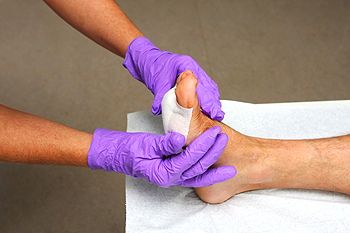
Diabetic foot ulcers are serious complications of diabetes, occurring due to poor circulation, nerve damage, and reduced immune function. High blood sugar levels can impair blood flow and sensation in the feet, leading to delayed wound healing and increased vulnerability to infections. Left untreated, diabetic foot ulcers can result in severe complications, including tissue damage, gangrene, and even limb amputation. Non-invasive treatment typically involves wound debridement, dressings, offloading pressure, and antibiotic therapy to promote healing and prevent infections. More invasive interventions may include surgical debridement, skin grafts, or in severe cases, amputation. If you have diabetes, it is strongly suggested that you schedule an appointment with a podiatrist for a comprehensive assessment, wound care, and education on preventive measures tailored to your specific situation.
Wound care is an important part in dealing with diabetes. If you have diabetes and a foot wound or would like more information about wound care for diabetics, consult with one of our podiatrists from Bergen Foot & Ankle. Our doctors will assess your condition and provide you with quality foot and ankle treatment.
What Is Wound Care?
Wound care is the practice of taking proper care of a wound. This can range from the smallest to the largest of wounds. While everyone can benefit from proper wound care, it is much more important for diabetics. Diabetics often suffer from poor blood circulation which causes wounds to heal much slower than they would in a non-diabetic.
What Is the Importance of Wound Care?
While it may not seem apparent with small ulcers on the foot, for diabetics, any size ulcer can become infected. Diabetics often also suffer from neuropathy, or nerve loss. This means they might not even feel when they have an ulcer on their foot. If the wound becomes severely infected, amputation may be necessary. Therefore, it is of the upmost importance to properly care for any and all foot wounds.
How to Care for Wounds
The best way to care for foot wounds is to prevent them. For diabetics, this means daily inspections of the feet for any signs of abnormalities or ulcers. It is also recommended to see a podiatrist several times a year for a foot inspection. If you do have an ulcer, run the wound under water to clear dirt from the wound; then apply antibiotic ointment to the wound and cover with a bandage. Bandages should be changed daily and keeping pressure off the wound is smart. It is advised to see a podiatrist, who can keep an eye on it.
If you have any questions, please feel free to contact our offices located in Fort Lee, NJ and Flushing, NY . We offer the newest diagnostic and treatment technologies for all your foot care needs.
